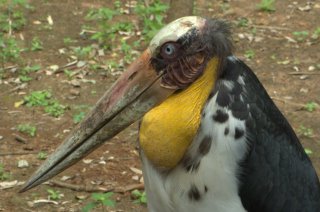 The Adjutant is named so, because of its similarity with the military Adjutant, an assistant who stands at attention while superiors file in. The Adjutant will stand motionless for hours at a time in its tropical home. It is a native East Indian Stork standing approximately 5 ft high, the tallest 6 or 7 ft in height. The Adjutant Stork is found in India and Southeastern Asia and protected by law in some countries. Primarily white with slate colored wings and back and flesh colored neck and head with some hair like feathers. The Adjutant is the largest of the storks, with a naked pouch on the chest that can inflate making the appearance of a pink balloon with black spots. The pouch is believed to serve as an air resorvoir in special circumstances. They build their nests high on the limbs of the majestic silk cotton tree. But in recent years, a growing number of hatchlings have been falling out of the nests. In Assam, people are using nets tried around tree trunks to save the babies. There are only about 1,000 greater adjutant storks left in the world, and about 80 percent of them are in the Indian state of Assam. Greater adjutant storks are a highly endangered species that requires complete protection wherever it occurs, in breeding and non-breeding periods. The Adjutant feeds off carrion and offal, its digestive system makes it possible to swallow and digest large bones. The Adjutant is a scavenger and eats smaller noxious animals like snakes. In Oriental cities the Adjutant was often present on the street scavenging meals, though due to improvement in sanitation, these storks have became rare.
The Adjutant is named so, because of its similarity with the military Adjutant, an assistant who stands at attention while superiors file in. The Adjutant will stand motionless for hours at a time in its tropical home. It is a native East Indian Stork standing approximately 5 ft high, the tallest 6 or 7 ft in height. The Adjutant Stork is found in India and Southeastern Asia and protected by law in some countries. Primarily white with slate colored wings and back and flesh colored neck and head with some hair like feathers. The Adjutant is the largest of the storks, with a naked pouch on the chest that can inflate making the appearance of a pink balloon with black spots. The pouch is believed to serve as an air resorvoir in special circumstances. They build their nests high on the limbs of the majestic silk cotton tree. But in recent years, a growing number of hatchlings have been falling out of the nests. In Assam, people are using nets tried around tree trunks to save the babies. There are only about 1,000 greater adjutant storks left in the world, and about 80 percent of them are in the Indian state of Assam. Greater adjutant storks are a highly endangered species that requires complete protection wherever it occurs, in breeding and non-breeding periods. The Adjutant feeds off carrion and offal, its digestive system makes it possible to swallow and digest large bones. The Adjutant is a scavenger and eats smaller noxious animals like snakes. In Oriental cities the Adjutant was often present on the street scavenging meals, though due to improvement in sanitation, these storks have became rare.Of the genus Leptoptilus, common in tropical Asia and Africa. The two asiatic species, L. dubius and a smaller species is found in the East Indies (L. javanicus). Another closely related species, the marabou, L. crumeniferus, inhabits Africa. These three species produce the beautiful marabou feathers sold and used in crafts. The Adjutant cares for its young in a large nest on trees or cliffs made of sticks.
No comments:
Post a Comment